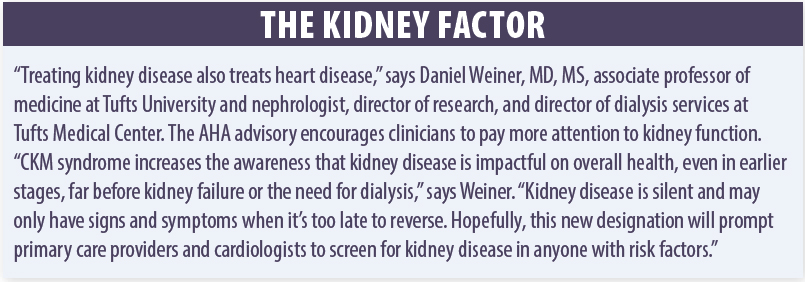Are You at Risk for CKM Syndrome?
The American Heart Association (AHA) has defined a new syndrome— and strategies for addressing it—in the hopes of reducing the high rates of cardiovascular disease in the United States. Called Cardiovascular-Kidney-Metabolic (CKM) syndrome, this constellation of health conditions recognizes the strong connections among heart disease, kidney disease, diabetes, and obesity.
All Together, Now.
We tend to think of— and treat—health problems as individual entities. For example, someone might see an endocrinologist for type 2 diabetes and get statins for their high cholesterol from a healthcare provider. If their kidney function begins to decline, they’ll see a kidney doctor (a nephrologist). But all of these conditions are actually connected. We know that people who have cardiovascular disorders are more likely to have kidney disfunction and vice versa. There is a growing understanding that abnormal metabolic states, including diabetes, play a key role in this connection, and that kidney disfunction connects diabetes and heart problems (especially heart failure).

In their advisory announcing CKM syndrome, the AHA cited data that having type 2 diabetes increases the risk of dying in the next 10 years by nearly eight percent. Chronic kidney disease increases this risk by over 11 percent. But having both together increases this 10-year mortality rate by 31 percent.
The most significant impact of all of these conditions is an increase in cardiovascular disease (CVD) events and death from CVD (including heart attack, stroke, and heart failure). Officially recognizing and naming this interconnectedness, therefore, paves the way for new strategies for prevention, earlier detection, and management of CVD— the leading cause of death in the U.S.
CKM Syndrome.
Risk factors for CKM syndrome include elevated body weight, high blood pressure, and elevated cholesterol, blood sugar, and triglyceride levels. Currently, one in three U.S. adults have three or more of these risk factors. The syndrome is divided into four stages:
➧ Stage 1—overweight or obesity;
➧ Stage 2—metabolic risk factors (high triglyceride levels, high blood pressure, type 2 diabetes, or metabolic syndrome) or moderate to high risk chronic kidney disease;
➧ Stage 3—high predicted CVD risk or very high risk chronic kidney disease;
➧ Stage 4—diagnosed CVD. While the greatest impact of CKM syndrome is its link to all types of CVD, it is also associated with increased risk for kidney failure, premature cognitive decline, fatty liver, obstructive sleep apnea, and cancer.
Treatment.
The good news is, there are now effective treatments for metabolic risk factors and kidney function that also support cardiovascular health. Some drugs that have been used for decades to help treat type 2 diabetes are now widely popular for weight loss and have been demonstrated to reduce CVD deaths; other drugs are now known to help prevent kidney failure and reduce hospitalizations from heart failure. Certain blood pressure medications have been shown to also benefit the kidneys. (For information on the importance of increased screening for kidney disease, see The Kidney Factor box).
What to Do.
A healthy lifestyle and regular check-ups are your best defense against all the components of CKM syndrome. See the Take Charge! box for tips.

The post Are You at Risk for CKM Syndrome? appeared first on University Health News.


